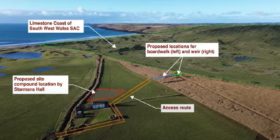Welsh Government Harnesses Drones to Enhance Fisheries Management and Enforcement

THE Welsh Government is planning to take to the skies to help monitor what’s caught beneath the waves.
It is seeking interest from drone suppliers to provide equipment with a bird’s eye view of the sea and estuaries below.
A contract notice on public sector procurement website Sell2Wales said the aim was to improve the management and enforcement of Welsh fisheries.
“This will be the first time we will use drones as part of our fisheries management,” said a Welsh Government spokesman. “We already have access to a number of different tools and methods for managing fisheries including the operation of fisheries patrol vessels, access to vessel monitoring systems and statutory submissions of data.”
The Welsh Government is responsible for the management of fisheries, including estuaries and intertidal areas, up to the midway point in the sea between England, the Republic of Ireland, Northern Ireland and the Isle of Man. It also manages some cockle beds.
Natural Resources Wales (NRW) is responsible for the management of freshwater fisheries and also some cockle beds.
The Welsh Government spokesman said: “The drones will be for Welsh Government primarily, however we do carry out joint working with other agencies including NRW, and once the drones are operational we will consider their use for any joint exercises.”
NRW said it has used drones of its own to photograph and map habitats in the Dee River, North Wales, but that it wasn’t aware of them being used for fisheries enforcement.
Jim Evans, chairman of the Welsh Fishermen’s Association, an industry group, said the proposed use of drones by the Welsh Government was “both news and surprising”.
He said every fishing vessel had monitoring devices and that catches and method of capture were also recorded. “It is unclear to me what additional value would be provided by drone surveillance given that 90% of the Welsh fleet are predominantly inshore, small-scale, and under 10-metre vessels using low-impact static gear,” said Mr Evans.
A cross-party Parliamentary report published last year said Wales had 249 active fishing vessels in 2021, which landed 4,998 tonnes of fish and shellfish worth £11 million and supported 105 full-time equivalent jobs. It said Brexit, fuel prices labour shortages and access to fishing rights were the main issues facing the sector.
By BBC LDRS
Spotted something? Got a story? Email News@News.Wales










